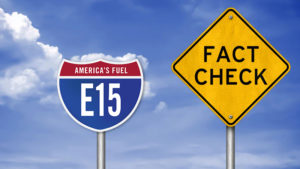 Media coverage of President Biden’s announcement last Tuesday that consumers will continue to have access to lower-cost 15% ethanol fuel this summer contained a great deal of misinformation, despite the best efforts of the ethanol industry to get the facts out.
Media coverage of President Biden’s announcement last Tuesday that consumers will continue to have access to lower-cost 15% ethanol fuel this summer contained a great deal of misinformation, despite the best efforts of the ethanol industry to get the facts out.
In a blog post Monday, Renewable Fuels Association President and CEO Geoff Cooper says “many reporters and editorial boards covering the news swallowed the oil industry’s talking points—hook, line, and sinker—without bothering to check the facts or talk to third-party experts who could give an unbiased perspective.”
This was especially true when it came to the reporting on E15 and air quality. Numerous media outlets falsely reported that EPA had previously “banned” E15 sales in the summertime due to “smog concerns. A little bit of homework would have quickly led reporters to understand that E15 has lower volatility than today’s regular gasoline and reduces emissions of the pollutants that can lead to smog.
Cooper offered a fact check list for some of the more common misconceptions – or downright falsehoods – about E15 and the action taken by the president last week.
Allowing summer sales of E15 is not new
E15 was sold year-round in 2019, 2020 and 2021. Thus, allowing year-round sales of E15 in 2022 (as President Biden has pledged to do) is really nothing new. It will not place new or unexpected demands on the marketplace. Rather, the action will simply keep an existing market for ethanol (and corn) open, while also ensuring that consumers who have enjoyed three years of uninterrupted access to E15 will continue to have the choice to purchase E15 all year long in 2022.
E15 sales were not restricted in the summertime due to “smog concerns”
The real reason E15 sales were restricted in the summer (prior to 2019) is because the fuel was held to a far more restrictive vapor pressure standard than regular gasoline, the result of an antiquated regulation.
As an oxygenate, ethanol has a long history of reducing smog and improving urban air quality.
E15 does not lower fuel mileage per gallon
E15 offers a lower cost per mile traveled, even when its slightly lower energy density is considered.
E15 does not increase greenhouse gas emissions or damage engines
E15 reduces GHG emissions compared to regular gasoline.
E15 is legally approved for use in more than 96 percent of all cars, pickups, SUVs, and vans on the road today.
Not a single confirmed case of “engine damage” or inferior performance has been reported since E15’s introduction a decade ago.
Allowing E15 to be sold in the summer months is not a mandate and will not impact food prices
E15 is not being required or mandated in any way.
Summertime E15 sales in 2022 will have little discernable impact on corn prices and no impact on food prices.

